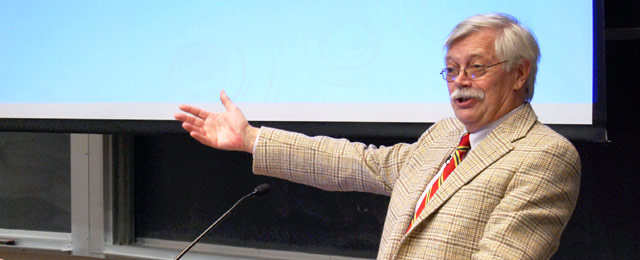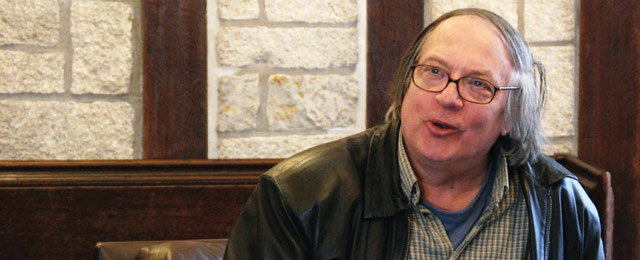Online courses directory (457)
This subject surveys main currents of European cultural and intellectual history in the modern period. Such a foundation course is central to the humanities in Europe. The curriculum introduces a set of ideas and arguments that have played a formative role in European cultural history, and acquaints them with some exemplars of critical thought. Among the topics to be considered: the critique of religion, the promise of independence, the advance of capitalism, the temptations of Marxism, the origins of totalitarianism, and the dialects of enlightenment. In addition to texts, we will also discuss pieces of art, incl. paintings and film.
This course uses scale models to design environments that orchestrate contrasting material properties and conventional constructional systems to create places that foster specific ways of inhabiting space. It also demonstrates how architecture differs from other forms of design. Intended for students to test aptitude for architectural design and to experience an unfamiliar mode of thought, it's conducted in a studio format, with lectures on architectural theory and history, and structured for students with no previous experience in design.
Required of Architecture majors.
Understanding the nature and value of play through the course of our lives, across cultures and communities.
This section of Expository Writing provides the opportunity for students- as readers, viewers, writers and speakers - to engage with social and ethical issues that they care deeply about. Through discussing selected documentary and feature films and the writings of such authors as Maya Angelou, Robert Coles, Charles Dickens, Barbara Ehrenreich, Martin Luther King, Jr., Jonathan Kozol, and Alice Walker, we will explore different perspectives on a range of social problems such as poverty, homelessness, and racial and gender inequality. In assigned essays, students will have the opportunity to write about social and ethical issues of their own choice. This course aims to help students to grow significantly in their ability to understand and grapple with arguments, to integrate secondary print and visual sources and to craft well-reasoned and elegant essays. Students will also keep a reader-writer notebook and give at least one oral presentation. In class we will discuss assigned films and readings, explore strategies for successful academic writing, freewrite and critique one another's essays. Satisfies Phase I and CI Writing Requirements.
Making decisions about managing natural resources can be difficult; this course explores why fairness needs to be part of policy.
We understand the world — and our selves — through stories. Then some of those hopes and fears become the world.
Learn how to create an impressive, fast loading websites using the methods introduced in the HTML5 History of API.
Financial institutions are a pillar of civilized society, supporting people in their productive ventures and managing the economic risks they take on. The workings of these institutions are important to comprehend if we are to predict their actions today and their evolution in the coming information age. The course strives to offer understanding of the theory of finance and its relation to the history, strengths and imperfections of such institutions as banking, insurance, securities, futures, and other derivatives markets, and the future of these institutions over the next century.
This course will explore Native American cultures and the impacts of colonial and U.S. government policies on them; European colonization with particular focus on the British in North America; the War for Independence against Britain and the framing of the U.S. Constitution; as well as the formation of political parties in the early republic. Full series: U.S. History 1: First Peoples to the Early Republic: Born in Colonialism U.S. History 2: The Civil War Era: Dividing a Nation U.S. History 3: The Gilded Age to the Roaring Twenties: The Emergence of Modern America U.S. History 4: The Great Depression to the War on Terror: Enter the World Stage
In this class, food serves as both the subject and the object of historical analysis. As a subject, food has been transformed over the last 100 years, largely as a result of ever more elaborate scientific and technological innovations. From a need to preserve surplus foods for leaner times grew an elaborate array of techniques – drying, freezing, canning, salting, etc – that changed not only what people ate, but how far they could/had to travel, the space in which they lived, their relations with neighbors and relatives, and most of all, their place in the economic order of things. The role of capitalism in supporting and extending food preservation and development was fundamental. As an object, food offers us a way into cultural, political, economic, and techno-scientific history. Long ignored by historians of science and technology, food offers a rich source for exploring, e.g., the creation and maintenance of mass-production techniques, industrial farming initiatives, the politics of consumption, vertical integration of business firms, globalization, changing race and gender identities, labor movements, and so forth. How is food different in these contexts, from other sorts of industrial goods? What does the trip from farm to table tell us about American culture and history?
Discover how psychology can help obtain evidence from eyewitnesses in police investigations and prevent miscarriages of justice.
This course examines the political (world order), economic (globalization), social/cultural (beliefs, values, and lifestyle), and psychological (human capacity for change) forces that are re-defining the quality of life in the 21st century. Students will leave Forums for a Future with an explicit (written) worldview of their own creation as the basis for developing a coherent sense of self-direction for living peacefully and sustainably on a crowded planet in the 21st century. Students should have some familiarity with the basic concepts of political science, economics, sociology, and psychology. Although an introductory level course in any of these areas is helpful, it is not necessary. Much of the material has been published by the instructor as op-ed pieces in newspapers and popular (not academic or technical) books. Any thoughtful person can and should grasp the messages and may simply skip the complicated conceptual writing and still profit from reading the contributions of others. It is not highbrow; it is intended to promote general public civic discourse. This course is based on a very popular honors level course at the University of South Florida. Participants should have related background and knowledge along with the ability to self-direct their learning.
Advances in cognitive science have resolved, clarified, and sometimes complicated some of the great questions of Western philosophy: what is the structure of the world and how do we come to know it; does everyone represent the world the same way; what is the best way for us to act in the world. Specific topics include color, objects, number, categories, similarity, inductive inference, space, time, causality, reasoning, decision-making, morality and consciousness. Readings and discussion include a brief philosophical history of each topic and focus on advances in cognitive and developmental psychology, computation, neuroscience, and related fields. At least one subject in cognitive science, psychology, philosophy, linguistics, or artificial intelligence is required. An additional project is required for graduate credit.
This course provides an overview of major works of social thought from the beginning of the modern era through the 1920s. Attention is paid to social and intellectual contexts, conceptual frameworks and methods, and contributions to contemporary social analysis. Writers include Hobbes, Locke, Rousseau, Montesquieu, Adam Smith, Marx, Weber, and Durkheim.
Start learning how psychologists comprehend and study human nature and its disorders.
This course covers the emergence of modern France. Topics include the social, economic, and political transformation of France; the impact of France's revolutionary heritage, of industrialization, and of the dislocation wrought by two world wars; and the political response of the Left and the Right to changing French society.
This course will explore government policies dealing with African-Americans and Native Americans; the rise of big business and urbanization; the second industrial revolution and immigration; U.S. overseas expansion and participation in the First World War; as well as progressivism and the modernist cultures of the 1920s. Full series: U.S. History 1: First Peoples to the Early Republic: Born in Colonialism U.S. History 2: The Civil War Era: Dividing a Nation U.S. History 3: The Gilded Age to the Roaring Twenties: The Emergence of Modern America U.S. History 4: The Great Depression to the War on Terror: Enter the World Stage
This class covers the history of 20th century art and design from the perspective of the technologist. Methods for visual analysis, oral critique, and digital expression are introduced. Class projects this term use the OLPC XO (One Laptop Per Child) laptop, Csound and Python software.
Furniture making is in many ways like bridge building, connections holding posts apart with spans to support a deck. Many architects have tried their hand at furniture design, Wright, Mies Van Der Rohe, Aalto, Saarinen, Le Corbusier, and Gerhy.
We will review the history of furniture making in America with a visit to the Decorative Arts Collection at the Museum of Fine Arts in Boston and have Cambridge artist/craftsman Mitch Ryerson show us his work and talk about design process. Students will learn traditional woodworking techniques beginning with the use of hand tools, power tools and finally woodworking machines.
Students will build a single piece of furniture of an original design that must support someone weighing 185 lbs. sitting on it 12 inches off the ground made primarily of wood. Students should expect to spend approximately 80 hours in the shop outside of class time.
Preregistered architecture students will get first priority but first meeting attendance is mandatory. Twelve student maximum, no exceptions.
The purpose of the course is to cultivate the sensibilities necessary for effective planning practice. This objective rests on one key assumption: that a set of key sensibilities creates the right mindset for practice.
Trusted paper writing service WriteMyPaper.Today will write the papers of any difficulty.



















